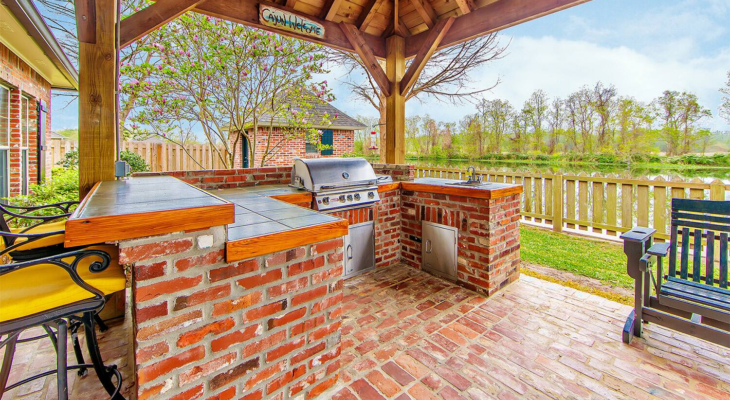Maintaining a clean and well-functioning outdoor kitchen is essential for both the longevity of your appliances and the overall enjoyment of your outdoor culinary space. A unique experience may be had in an outdoor kitchen, whether grilling or cooking al fresco. In this guide, we’ll explore key best practices to ensure your outdoor kitchen stays in top-notch condition, providing you with a hassle-free and delightful outdoor cooking environment.
Designing an Efficient Layout
When planning your outdoor kitchen, a thoughtful and efficient layout is paramount. Arrange your cooking and prep areas strategically, ensuring easy access to the essential components, including the grill, countertops, and the sink. Placing the sink near the cooking station not only facilitates the preparation process but also simplifies cleanup. For your new outdoor kitchen sink, choose materials that are strong and resistant to weather; stone or stainless steel are good choices because they can survive weather and regular use. A well-placed sink fosters a seamless flow in your outdoor kitchen, allowing you to transition smoothly between cooking and cleaning tasks.
Regular Cleaning Practices
Keeping your outdoor kitchen spotless requires consistent effort. Regularly clean the countertops, grill surfaces, and outdoor sink. Use mild detergents and non-abrasive sponges to avoid damaging the surfaces. For the sink, a mix of warm water and vinegar is effective in removing grease and maintaining a pristine appearance. Additionally, establish a routine for cleaning grill grates and other cooking utensils to prevent the accumulation of residue that could compromise both hygiene and flavor. In addition to regular cleaning, be mindful of the surrounding areas by sweeping away debris and fallen leaves, ensuring a clean and inviting outdoor kitchen environment.
Weatherproofing Your Outdoor Sink
Given its exposure to the elements, the outdoor sink requires special attention to withstand varying weather conditions. Invest in a high-quality cover to protect the sink when not in use. This will prevent damage from rain, sun, or harsh winter conditions. In order to avoid freezing, don’t forget to unplug and empty the water supply during the colder months. By doing this one step, you can prevent future damage and expensive repairs. Regularly inspect the cover for any signs of wear and tear, ensuring it remains an effective shield against the elements throughout the changing seasons.
Proper Waste Disposal
An often underestimated aspect of outdoor kitchens is waste disposal. Ensure your outdoor kitchen is equipped with a trash bin. Dispose of food scraps promptly to prevent unpleasant odors and to discourage unwanted guests like pests. Consider incorporating a composting system for organic waste, contributing not only to a cleaner outdoor kitchen but also to sustainable practices. In addition, composting enriches your garden soil, creating a positive environmental impact beyond the confines of your outdoor culinary space.
Maintenance of Plumbing and Fixtures
To guarantee the continuous functionality of your outdoor sink, regular maintenance of plumbing and fixtures is crucial. Inspect for any leaks and promptly address them to prevent water damage. Clean the faucet aerator periodically to maintain water flow efficiency. Conduct routine checks on hoses and connections, replacing any worn-out parts. By adopting these routines, you can make sure that the core of your outdoor kitchen functions well. Additionally, staying vigilant about potential issues and addressing them promptly will not only enhance the efficiency of your outdoor kitchen but also save you from costly repairs in the long run.
Seasonal Upkeep for Longevity
As seasons change, so do the demands on your outdoor kitchen. Before the arrival of winter:
- Take proactive steps to protect your outdoor sink and other components.
- Remove and store detachable items like faucets and hoses indoors.
- Apply a protective coating to surfaces, especially if they are susceptible to rust.
By addressing seasonal challenges head-on, you’ll extend the life of your outdoor kitchen and be ready to enjoy it when the warmer months return. As you prepare for the colder months, don’t forget to inspect the overall structure of your outdoor kitchen, ensuring that any loose or vulnerable components are reinforced or repaired.
Conclusion:
Maintaining your outdoor kitchen requires a combination of thoughtful planning and consistent upkeep. By focusing on an efficient layout, regular cleaning, weatherproofing, proper waste disposal, plumbing maintenance, and seasonal upkeep, you’ll ensure that your outdoor kitchen, including the essential outdoor sink, remains a functional and enjoyable space for years to come. Embrace these best practices to savor the pleasures of outdoor cooking and entertainment with family and friends.

